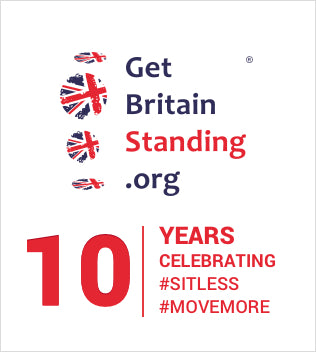Leaving? Don’t miss out …
Each Yo-Yo DESK® helps you burn 10 Marathons of
calories in a year!
Learn more about the
Health Benefits.
10% OFF Voucher Code: WELLNESS10
Subscribe to our newsletter

Subscribe to get 10% OFF*
*T's&C's apply
Keep Moving with Great Offers, Top Tips,
Desk Yoga and Active Working educational content.
Celebrating 10 years of the
Get Britain Standing campaign.



We will send you an email to reset your password.
Get Britain Standing
What others are saying:
"I used to have a sore back and shoulders on a regular basis, I’m pretty confident it was because I’d spend 10+ hours in a chair, staring at a screen, hunched over. I pushed my body because my mind wanted to keep working. It loves the feeling of being productive, even to the detriment of the body."
"Thanks to the stand-up desk and the dynamic nature of how I structure my day now, I rarely have physical complaints."
[John, from Cambridge]
"I like that I can easily walk away from the table. Back when I used to work in a chair at a desk, I often found myself 'trapped'. I’d get so lazy that I could spend hours staring at the screen, often doing non-productive work. The World Wide Web is a great procrastination tool after all."
"With a stand up desk I walk away from the computer all the time. You don’t experience that feeling of apathy or laziness that sets in while sitting."
[Claire, from West London]
"I love my standing desk. I've used it for a little over a year now, and wouldn't go back. I'm much more productive and have lost a lot of weight. I can’t say for certain it's due to the desk, but it wouldn't surprise me if it is."
[Marcus, from Bristol]
"With a stand up desk you are constantly taking micro breaks, moving around and looking at different things. Your eyes are not built to stare at objects, like a monitor, close up for long periods of time. They like to look at things in the distance and change focus from near to far and back again. This is exercise for the eye muscle, which like all muscles, is designed to be dynamic, to change, and not locked into one setting for long durations."
Because I walk away from a stand up desk more frequently, I’m not staring at the screen consistently.
Tip! – If you are a high intensity computer user and you want to look after your eyes, go outside and stare at the mountains, or buildings, or whatever is off in the distance for 15 minutes every two hours – preferably every hour. This could save your eyesight long term.
[Amanda, from Cheshire]
Please let us know your story and Contact Us
Benefits of Active Working to the Individual:- Revitalize your metabolism. Burn between 50 – 60 extra calories an hour
- Feel more positive, alert and more awake
- Reduce your risk of heart disease, diabetes, cancer and other chronic problems
- Contribute to better posture
- Promote healthier joints and spine. Prevention of muscle inactivity
- Relieve back and shoulder muscle pain
- Add years to your life
- Improved working environment
- Research shows a direct link between healthy employees and improved performance. More specifically due to resulting work breaks being shorter and fewer it has been concluded that productivity at a computer increases 12% - 18% using standing desk solutions.
- Increased motivation and job satisfaction resulting from a more dynamic and positive working style. Meetings are kept short and efficient.
- Improved internal communication and cooperation leading to increased performance, efficiency and service quality.
- Better posture and reduced risk of back pain
- Higher concentration on tasks
- Higher energy levels, especially afternoons.
- Improves focus and boosts creativity
- 1 in 3 employees believes their health is suffering due to work pressure
- Image upgrade for the company
- The average firm of 250 employees loses £4,800 per week due to sickness absence (ONS).
- Poor health and injury account for nearly 60% of all lost working hours. Over 80% of individuals who use standing desk solutions claim that they are experienced positive wellbeing results.
- Absenteeism in the workplace can fall by as much as 42% through wellness programs. The TUC reported that British businesses lose 4.9m days to employee absenteeism through work related back pain at a cost £5bn p.a.
- 8.2 million work days are lost due to mental health and stress related problems.
- 1 person in 4 takes time off work because of stress. 270,000 employees take time off work for stress related disorders.
- A Confederation of British Industry (CBI) survey, estimates employee absences incur a £15bn cost to the economy p.a.
- 12 million adults in the UK are obese. £2.5 billion is spent on inactivity due to obesity.
- 8.2 million work days are lost due to mental health and stress related problems.

 UK
UK EU
EU













